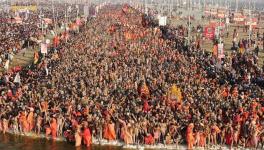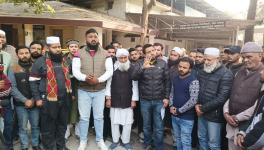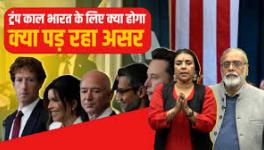India Closely Following Pakistan’s Footsteps : Pervez Hoodbhoy
Newsclick in collaboration with The Citizen interviewed Pervez Hoodbhoy, a nuclear physicist from Pakistan on the issues of radicalization of science and Indo-Pak relation. Dr. Hoodbhoy talked about how the current situation in India can be compared to that of Pakistan of 1980s where state was promoting islamisation of science. He took the example of 103rd Indian Science Congress where Lord Shiva had been declared as greatest environmentalist and Prime Minister Modi’s reference of plastic surgery in the past. Dr. Hoodbhoy explained that on similar lines, doctors and scientists in Pakistan have claimed that verse of Quran can lead to generation of new genes and can cure terminal illness. He thinks that India is following the footsteps of Pakistan and if it continues we may lose critical thinking ability. On the question of Indo-Pak relations, Dr. Hoodbhoy congratulated both the governments for their efforts to continue the peace talks after the Pathankot attack.
Rough Transcript
Prabir Purkayastha (PP): Hello and welcome to Newsclick. Today we have with us Prof. Pervez Hoodbhoy who is well known to Indian audience. Pervez good to have you with us. You know at the moment in India in a scenario which is somewhat reminiscent of what you went to the 80s when Pakistan started Islamising science itself and you started talking about science also being somewhat complimented by religion, religious education should be part of education. Do you think that it really had an adverse effect on Pakistan's science. What do you think about it's impact.
Pervez Hoodhoy (PH): I think it had quite amazing effect on Indians are following Pakistan on this regard. Now for example, in Indian Science Congress I heard Lord Shiva has been declared as a greatest environmentalist that ever lived and some scientists came blowing the conch to the Congress and said that by hearing this your mind will open up and you will get new thoughts coming in. This reminded me exactly of what is being said in biology department of the finest university in Pakistan LUMP by it's chairman who says by listening to Sura Ai Rehman that's the verse of the Quran. That new genes will be made and they will help people in recover from terminal illnesses and there should be special rooms in every hospital in Pakistan where this Sura is heard by patients. So it is amazing how close India and Pakistan has become. Of course, you will have a long way to go but you will catch up if you continue at this speed. That's an interesting proposition that this started really earlier and we are now following soon. But the problem that I have and the question that I would like to ask if you ask some of the Pakistan's scientists which I have they keep on saying it really did not effect science and that of course for me is a very doubtful statement because obviously, they do not want to criticize the establishment in Pakistan. So how will it effect Pakistan's science.
PH: That's a good question. It did not effect directly in the sense that see science is technical and you learn techniques and you learn to do this and that and in a sense it is becoming like engineering these days, it's become mastering techniques and so I will say that okay, some senior scientists comes along and say that you gets genes out of energy this does not directly effect the pursuit of science in Pakistan and similarly in India, India has been able to send Mangalyan to Mars and it's been able to do very good work. On the other hand, it does effect your overall mindset and it effects the teaching of science and the propagation of science and so at a deep level, where one should be applying the scientific method and applying the need for constant questioning, the need for evidence that aspect that fundamental aspect of science is now being given second place. Second level certainly in Pakistan but now increasingly more in India and I am really sorry to see that.
PP: Now, that's a very important point you are making, science needs critical thinking and what this actually does is to destroy the critical part of science is that how to question, how to think about things and create theories new sciences it were. Do you think this is going to promote at best copycat science but really deep inside into science will be missing if you loose that critical element.
PH: I think so because science is predicated on questioning on asking what there is on the basis of evidence. Now, if people start believing holy text whether it was Vedas, whether it is Quran or Bible or whatever then of course, all the answers to the world are supposedly in this text. Why look beyond and when people take religion seriously in this manner and think that science can be extracted out of holy text, then they are certainly going to loose out. Moreover, I think that the attitude of questioning that's a part of modernity that's something very different from a traditional authoritarian society and I am afraid that we on the sub continent are succumbing more and more to authoritarianism that all knowledge is embedded in the books rather than going out and finding our for ourselves and actually becoming inventors of knowledge. I might might say that the notion of inventing knowledge is not there in the holy books. You can go out and discover but you can not invent. That is for the powers up that lie above.
PP: You talk mentioned passing about gins producing energy. Can you through little more light because I believe was “a serious proposal by a nuclear physic t or physicist” I don't remember who. Who have actually proposed and got some funding for it.
PH: It was not Nuclear physicist, it was a nuclear engineer by the name of Sultan Bashiruddin Mehmood and he was the principal designer of reactor at Khushab which produces Plutonium for making bomb. He did put rhis across as a proposal and we had a grand fights some 40 years ago but okay, that is not taken seriously. However, what is more alarming to me is that in our universities actually workshops being held on things like Gins and Kala Jadoo, black magic and speakers have full auditoriums available to them. Their students come and they sit and transfix by these speakers who talk about the extra terrestrial speakers being come and actually and change their lives and have the potential of doing destruction and no good.
PP:It is similar to genetics being practiced in the way in the vedic periods in Mahabharata and Ramayana. As you said we seem to be following a little late but nevertheless following in a very similar line. The question that I have that looking at what's happening in Pakistan and this is of course something very dissimilar to what's happening here. Do you see a change in the Pakistani state with respect to thinking that if we do a certain set of things protecting certain kind of violence that is taking place as long as it does not happen in India, in Pakistan, it happens in Afghanistan it happens in India that Pakistan is a state that it would be beneficial for it because it is somehow a part of it's strategic depth. Do you think there is any change in this kind of thing? I remember you criticized last time that Pakistan's attitude to this is the problem or Pakistani State attitude is the problem.
PH: I am indeed I was critical and I am critical because Pakistani state has totally renounced it. There is still a little bit of that left. But I am very happy now the realization is sunk in that having extremists around who actually intended as a force, a subterranean force for defeating bigger powers or actually executing our foreign policy that thought now seems to be disappearing because the cost of that have become very apparent. After all what happened in army was not carried out by Israel and the United States or India. It was carried out by those who have at an earlier time being nurtured by the Pakistani state and these are snakes. You breed them for attacking the other but they come back and by cue. That realization is indeed taking root in Pakistan.
PP: Do you think that this is the reason that this time response to what has happened in has been a little more positive and we can hope that the kind of thought which is the third time happening between Sharif and Modi will actually continue.
PH: I am actually very pleased by the matured reaction shown by both the Pakistani and the India side. Earlier on, Pakistani reaction has simply of denial, this can't be our people. This must be wound inflicted by India upon itself because it wants to put Pakistan it bad light. Now none of that. Now it is yeah give us evidence and yes, we are worried and please tell us enough so that we can make a good case so we must lock up Jaish E Mohammad and so far not Hafiz Saeed but certainly Masood Azhar and so forth. So I think, this time around there has been really a positive attitude shown by Pakistan and posoitive attitude shown by India as well because they did not go out and say your terrorist, your terrorist, we are going to hit you. We know now in the world where the nuclear weapon exists and where they can possibly be used as well. This time around, India also behaved maturely. It did not say, Pakistan you are just harboring terrorist we are going to come and attack you,we want to destroy terrorist camp etc.etc. They did not do that they said well, these are attempts to derail the talks Pakistan must take the action but we are not going to be deterred by such random action. I think that's a sign of maturity if pursued further, it will be mutually beneficial to both the countries to us particularly because these terrorists has exerted enormous toll upon Pakistan and if there is peace between India and Pakistan I don't say friendship, friendship can come later first comes peace, then we will be spared discussed as will you and all kinds of potentialities opened up.
PP: It's interesting people from Pakistan and India meet. It's always warm, it's always friendly, when I have gone to Pakistan you have come to India, we find the response of the people very very warm. The minute they get into the television studio they pick up their pens, that's where the vitriol starts flowing. So how much of it is really manufactured by the nass media itself is the question. Of course, there are deep differences that appear between the state. Is this you think Nawaz Sharif from the Pakistan Muslim League and you have Modi representing essentially the right wing Hindu forces in this country have a better shot at peace than secular governments? Because they the ones who have been the spoilers generally.
PH: But I would not call Nawaz Sharif as an advocate of a religious party in Pakistan. Earlier, he was. In 1999, he wanted to impose Sharia on Pakistan but he in the long way since then, may be appearances in Saudi Arabia have convinced him that's not the way for him to go to Pakistan. But since coming back, he has been a relatively more matured and I would say that hardcore religious parties in Pakistan the Jamat Islami, the Jamiat E Ulema E Islam they don't get any substantial fraction of the popular vote. So that's the clarification over there. I think that between India and Pakistan now potentialities have opened up and now in spite of Narendra Modi and it's initial hard-line anti-Pakistan stand but again I think that maturity has been shown over here and really what else can you do but talk to each other and make overtures for peace in this Nuclear age.
PP: Thank you very much Parvez also bringing out the risk of two Nuclear armed powers in this situation where they are at a kind of stand off which can spill over into war. And that kind of scenario is obviously not only dangerous for South Asia for all of us but also for the world. Thank you very much for bringing out various issues. Hope to talk more with you even when you are back in Pakistan.
Get the latest reports & analysis with people's perspective on Protests, movements & deep analytical videos, discussions of the current affairs in your Telegram app. Subscribe to NewsClick's Telegram channel & get Real-Time updates on stories, as they get published on our website.
























